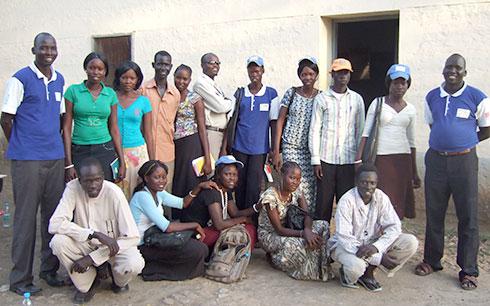 Peer educators in Malakal, Sudan, informing local communities on family planning
Peer educators in Malakal, Sudan, informing local communities on family planning
The needs are great in Malakal, Southern Sudan—where you can almost count on one hand the vegetables that are available in the local market. Rain falls heavy for half the year and drowns out what limited roadways exist. Transportation is often limited to donkeys, or people travel by foot. It is against this backdrop that the Women’s Refugee Commission embarked on a pilot project in Malakal in 2009 to improve the health and lives of refugee and displaced women and families. We wanted to determine whether community-based distribution of family planning—with community workers and volunteers informing their peers about services through home visits, health education sessions and radio shows—would be effective. Based on a trip I made to Malakal recently and the data so far, the signs are very good.
Malakal is one of the larger towns in Southern Sudan and is located right on the border with the North. Presumably, now that the referendum has occurred, things will improve in this area. But it will take a long time for the region to recover and rebuild after two decades of war and conflict, which forced more than 4 million people from their homes and claimed the lives of more than one million. It’s estimated that from 2005—2009, more than 2.2 million refugees and internally displaced people returned to their homes in Southern Sudan, and this number is only likely to grow in the near future. Health services are scarce, and where they do exist, they are of varying quality. Not surprisingly, Southern Sudan has one of the worst maternal mortality rates in the world; 2,054 maternal deaths per 100,000 births. Better access to family planning and other reproductive health services would surely bring this rate down—and save thousands of lives.
Partnering with the American Refugee Committee and the local Drama Youth Rights Association, the Malakal project is reaching a total population of 126,500. The local community workers and peer educators span the area, offering information on family planning options, providing condoms and the contraceptive pill, and referring prospective clients to health facilities for other family planning methods. Their capable and hard work is paying off: The uptake of contraception is significant and much higher even than expected. The average number of people newly accepting family planning every month has nearly tripled since the beginning of the project.
I met several young women who were sexually active but had never tried, or even heard about, contraception before being informed by their community workers. Access to family planning was allowing them to stay in school and postpone or space their pregnancies. And men appeared supportive as well. They recognized the value of contraception and how it could help improve their lives. I remember a couple, Joy and David, whom I met at Malakal Teaching Hospital. David was excitedly accompanying his wife to receive a hormonal implant contraceptive. I was thrilled to see a man so excited for his wife to receive the implant and respectful of his wife’s decision. They had learned about the method through our project and decided it was right for them: They had 11 children, two of whom had died, and they knew they didn’t want to expand their family any further. This was just what they were looking for.
Stories like Joy and David’s suggest community-based distribution of family planning in crisis settings like Malakal have significant impact. Contrary to popular belief, demand exists for contraception in such settings—once people have the information they need to make decisions and services are made available. Most importantly, family planning is a lifesaving intervention in places like Malakal, where pregnancy and childbirth can be extremely risky. Increasing access to family planning options will not only improve lives, but will save many.

